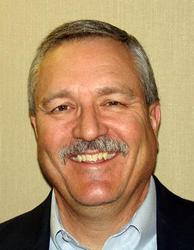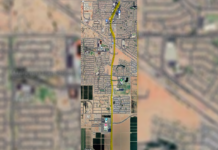
With his current contract expiring in January, City Manager Kevin Evans sat down with InMaricopa to share this thoughts on nearly three years with the city of Maricopa.
What do you feel is the greatest community accomplishment thus far during your tenure with the city?
Kevin Evans: I would have to say that thus far, the greatest community accomplishment is the passage, by a 2 to 1 margin, of the $65.5 million parks bond authorization. This was offered in response to the first citizen survey that was done. The people gave the council their opinion, the council put it out there for a vote and the people voted to do it. The system works when you listen to the people, and the council did just that.
Where do you see Maricopa in 5 years?
Evans: I hope to see Maricopa as one of the first to really recover on the housing front with some really solid jobs that are beginning to reverse the daily commute to Phoenix. We have tried to position Maricopa to be the place where the builders will start back first. City staff and council have done some very innovative things to help the development community and home builders to protect their investments in Maricopa so that the “red tape” is cut when it comes time to build again. Therefore, when the recovery comes, we will be ahead of the curve and at the front of the line.
In five years, local businesses will be adding more employees and inventory to keep up with the demand; Central Arizona College is up and running; a medical facility is serving the community; our second hotel is open; in place of the feed yards we have a couple of new base job employers; a movie theatre is entertaining our citizens; several community services facilities will be online to provide resources and recreation to the community; and we will be having serious discussions with more national retailers.
What is the biggest challenge facing the city?
Evans: Surviving the down cycle and the long time on the bottom that seems to be where the economy, and housing in particular, is destined to be for a little while longer. We have several indicators that things are beginning to pick up just a bit, but investors are still tentative, to say the least. This economic reset is worldwide. It is particularly tough in Arizona because of the dependence on housing growth. Efforts to diversify the Arizona economy at state and local levels are more important than ever before. In Arizona, our economic development tools are much more limited than in other states. Economic development is a tough business. A recent research report conducted internally by the Greater Phoenix Economic Council demonstrates a scary reality – the way it appears we will recover from this recession will put us at an even greater dependence on the industries that failed, putting us so deep into the recession (retail, construction). We must diversify the state’s economic base.
How is the city tackling that issue?
Evans: The city council has focused on economic development from the beginning and continues to do so. Everyone realizes that without having some solid base line jobs here we will not be sustainable. We focus very hard on every opportunity and build relationships along the way. Doing economic development is about building long-term, trustworthy relationships. It does not happen overnight, but, if you stay focused long enough with consistent effort and resources, it will start to turn around. I can tell you we are on the verge of some really great things for Maricopa.
What has the city done to improve the business climate?
Evans: We are staying focused, we are building relationships, the staff and the council is working very hard in every area possible to make Maricopa business friendly. We are solid partners with the Chamber of Commerce; we have created the Maricopa Economic Development Alliance (memberships available soon); we created the developer bill of rights; the one-stop-shop; and business is now the business of the city. One of the things the staff understands is that we are here to facilitate rather than regulate. We restructured the Development Services Department with that premise in mind. That is probably the single most important realization for the team.
What else can the city do to improve that climate?
Evans: Keep looking for ways to improve and listen to all the input we can get from our citizens and the business community. Get some solid base line jobs in place. That is the best way to turn things around every time.
How is the success of a city measured?
Evans: By the satisfaction of its citizens (we do a citizen satisfaction survey every two years), the success of its business community, its reputation statewide, the success of its economic development efforts and the sustainability of everything that it does.
What do you feel are the shortcomings?
Evans: I don’t know I would call them shortcomings. Things in a city can take a long time to happen. A lot of time there is a lot of process that stands in the way of getting things accomplished, and that can frustrate the issue. However, we have to have these processes.
How are you addressing the process issue?
Evans: As a city becomes more institutionalized, processes become faster. As a new city we have done an exceptional job working through the establishment of processes. As the years go by we are getting better and better. We are working on code rewrites to be more consistent and eliminate duplication. We are ensuring we have no more processes than are necessary.
How would you rate the success of the city?
Evans: We have done well given unrealistic expectations. This is a community born in a steep economical decline and managing the expectations in the reality of the economy is very tough. We have to keep the consistent mantra of economic development, and we will be in a good position moving forward.
Do you feel the city is top heavy?
Evans: We are one of the most successful communities in the state, and our staff model is similar to that of Goodyear. Their model works well for them, and a similar model works well for us. By having two assistant city managers, I am able to focus on one of the most critical areas in the city: economic development.
Where do you hope to be in five years?
Evans: When I first got into the business of being a city manager, most people held that position two years on average. Since that time, the national average for a city manager has grown to four to five years. In five years I hope to be right here in Maricopa, sitting in a new city complex or possibly spending time at the multigenerational complex. I will be of service to this community for as long as I am wanted.
Compare Maricopa today to Maricopa when you started?
Evans: It is the same in a lot of ways. However, we have seen a little more maturity, a little growth in retail and industrial. Yet, it is still a community that is very much underserved in both sectors. We are now, though, getting a lot more looks, nibbles and questions from potential developers than in the past, and it is only a matter of time before really exciting things start to happen.
Submitted photo






![In mayoral race, it’s the Nancy Smith show Maricopa Chamber of Commerce Executive Director Kelly Anderson grills incumbent Mayor Nancy Smith in election's first campaign event April 30, 2024, at Southern Dunes Golf Club. [Elias Weiss]](https://www.inmaricopa.com/wp-content/uploads/2024/04/CRM_1009-218x150.jpg)
![Merging lanes incite more 347 anger A merging lane sign sits on the side of State Route 347 northbound lanes during evening traffic on April 30, 2024. [Monica D. Spencer]](https://www.inmaricopa.com/wp-content/uploads/2024/04/spencer-043024-adot-merging-lanes-347-web-218x150.jpg)



![City gave new manager big low-interest home loan City Manager Ben Bitter speaks during a Chamber of Commerce event at Global Water Resources on April 11, 2024. Bitter discussed the current state of economic development in Maricopa, as well as hinting at lowering property tax rates again. [Monica D. Spencer]](https://www.inmaricopa.com/wp-content/uploads/2024/04/spencer-041124-ben-bitter-chamber-property-taxes-web-218x150.jpg)





